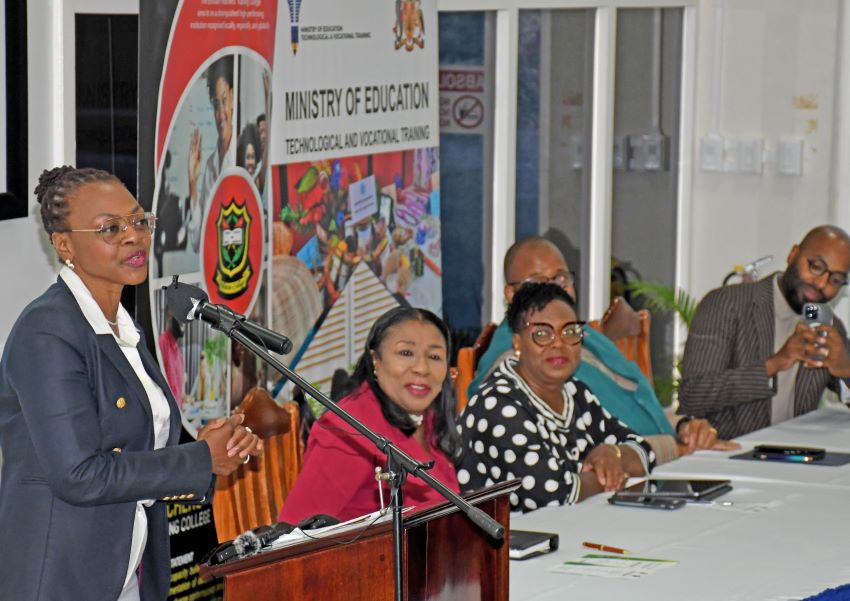
Professors from the Gordon Institute for Advanced Study Teachers College, Columbia University (TCCU) are excited about teaching two new programmes being conducted by Erdiston Teachers’ Training College (ETTC) and facilitated by the teaching staff of TCCU.
Speaking at the recent orientation ceremony for participants, Professor Christopher Emdin said it was “beautiful” to stand in front of them and see “these faces who will at some point reflect the next wave of innovation in teaching and leadership on the island”.
He explained why the partnership between ETTC and TCCU matters. “It is the final matching up of an entity outside of you to recognise the greatness of you that you already knew, and then saying together, we’re going to facilitate and speed up the vision of the greatness of Bajans that we always knew existed through the only thing we know that can shape the world, which is education,” he stated.
Professor Emdin pointed out that the partnership between the two campuses was not a ‘labour of love’ on their part.
“This is not serviced by Columbia. This is people matching intellectual wits to create a model that’s not yet been seen across the world, and as you see each other in this room, I don’t want you to think of this as a certification programme through Columbia or Gordon Institute or whatever else it is. See this as a history-making and defining moment to re-orchestrate what education, teaching and leadership can look like now.”
He continued: “People will write stories about this day. When we marked this moment, we selected this group, and we said, we are going to push you. We’ll push you. We’re going to challenge you. We’re going to make you feel uncomfortable. We’re at the same time going to celebrate your gifts. We’re going to recognise that as faculty, we don’t have all the answers, but we’ve got a whole lot of research; we have a whole lot of knowledge; we have a whole lot of experience, but we’re also going to value your research, your knowledge, your experience. We’re not looking at this as us and planting things into you. We’re looking at a partnership together.”
Professor Yolanda Sealy-Ruiz, who is of Barbadian descent, is one of Columbia’s programme facilitators. She told participants that it is an honour to be part of the partnership between the universities, adding that the teaching assignment is “probably the most important thing that I’ve done in my 30 years of teaching” and she hopes that it makes her Barbadian father proud.
“Nelson Mandela, who knows something about struggle, who knows something about fighting oppression, who knows something about freedom, dreaming, who knows something about making a difference, said that education is the way, not a way, the way to change the world,” Professor Sealy-Ruiz stated.
She encouraged the participants to know themselves, understand the power within them, and engage in self-knowledge, even if it is uncomfortable. She added that there is no mystery to teaching the nation’s children and advised the teachers to treat the children like human beings and love them deeply.
Professor Sealy-Ruiz also urged them to love the Barbadian culture, knowledge and ancestry and to use it as a way to resist the lies that they have been told about what system is best to teach our children.
“The beauty of our diversity is the beauty of our brilliance. And God made that so. So, if God made that so, it must be right, and in that sense, let us be teachers and let us be leaders who see the beauty of diversity and approach what we do with critical love, with critical humility, with critical reflection, with understanding of our history, being willing to do the self-work, what I call archaeology of self, and to interrupt those systems that say we are less than, and we don’t deserve more.”
Professor Edmund Adjapong, who is also from Columbia University, expressed his eagerness to teach. “I’m really excited to sit with you all, to learn with you all, to push you all, and I’ll share a little bit about my educational experience and why I’m here.
“What you’re getting here is, folks who, as you will notice and as you will learn throughout this process and this experience, are a family, and we are here to usher and welcome you all into our family and to support and train you all to be the best that we can be for our students,” he said.
Professor Adjapong shared, that upon reflection of his childhood experiences, he attributes poor educational experiences and opportunities as the catalyst which propelled him to become an educator.
“I had really poor teachers; they weren’t the best. They didn’t support me the way that I needed support as a young black male in New York City. So, my research focuses on youth culture. How do we leverage youth culture in the classroom to support and engage students? How do we love our students? How do we create opportunities in spaces of joy, and ultimately, how do we support our students and find the opportunity to liberate themselves within the structures that they find themselves within?”
He told participants that they were going to embark on this journey to support each other and “learn different strategies and teaching and approaches”.
“We’re going to embark on this journey to figure out how can we best connect and engage with our students. And we’re going to embark on this journey to support and liberate our students to support them into doing that within themselves,” he encouraged.
